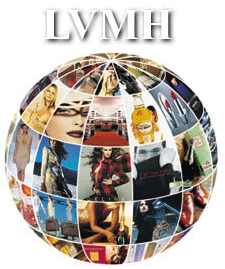Thursday, September 16, 2010
LVMH is the Best Global Luxury Brand
Despite the economic downturn, several luxury companies were able to increase the value of their brands in 2010, according to the 11th annual ranking of the "Best Global Brands," by Interbrand, a global brand consulting firm.
Among luxury brands, LVMH ranked the highest on the list at 16th, followed by Gucci (44), Hermes (69), Tiffany & Co (76), Cartier (77), Armani (95). All of these brands saw growth this year because they continued to invest “in their heritage and legendary status,” Interbrand said in a statement. “Outstanding customer service and a focus on unique in-store and online experiences allowed them to stay strong, even while consumers cut back spending.”
Burberry, which ranks 100 on the list, saw no change in its brand value this year.
For the 11th year straight, Coca-Cola retains its top spot as the number one ranked brand on the list. But the bigger story is the growth of technology brands, with IBM (2), Microsoft (3), Google (4), Intel (7), HP (10), Apple (17) and BlackBerry (54).
Apple increased brand value 37 percent “through carefully controlled messaging and an endless wave of buzz surrounding new product launches,” Interbrand said. Google saw a 36 percent increase in value over last year, “bringing the brand closer than ever to rival Microsoft.” Meanwhile, HP, despite a challenging year, “made smart additions to its product portfolio and swiftly expanded the HP brand to protect its ranking on the list. BlackBerry’s brand value grew 32 percent and it remains “the most popular smartphone for business users, despite pressure from Apple as it edges into the corporate world.”
A number of prominent brands faced extraordinary crisis in 2010 resulting in stalled growth, value loss and in the case of BP, failure to make the ranking this year. BP's environmental disaster and inability to make good on its brand promise of "Beyond Petroleum" led to it falling off of the list and helped competitor Shell emerge as an industry leader, now ranked number 81, up from number 92 in 2009. Although the Toyota (11) recall caused the brand to lose -16 percent of its brand value, its long-standing reputation for reliability, efficiency and innovation helped it weather the crisis better than expected. Goldman Sachs (37) was once the envy of Wall Street, but now faces the dichotomy of strong economic results and an angry public that will continue to lash out until the company begins to demonstrate that it is making sincere efforts to better align its ethics with its brand.
During a difficult year for the auto industry, Mercedes Benz (#12) and BMW (#15) were able to sustain and build their value through innovative design and a focus on delivering premium value vehicles with luxury features. Using customer feedback, largely drawn from YouTube, Flickr, Twitter and Facebook to launch the 2009 Fiesta, Ford (50) stands out as one of the best example of how to use social media. Award-winning products like the Q5 and rich heritage help Audi (63) lead industry growth this year with a 9% increase in its brand value.
"2010 was the beginning of a long road back towards economic recovery," said Jez Frampton, group chief executive at Interbrand. "From real-time customer feedback through social media to increased transparency about corporate citizenship, brands were faced with a profound change in the way they relate to customers and demonstrate their relevance and value. Despite this new paradigm of brand management, the advantages of building a solid brand remain the same."
In the financial sector, legacy brands Citi (40) and UBS (86) lost double-digits in brand value, while Santander (68), Barclays (74) and Credit Suisse (80) made their debut on the list for the first time. “Their ability to stay true to brand promises in unsure times, and avoidance of the subprime mortgage crisis, helped them stay the course, Interbrand said.
Interbrand publishes the ranking of the top 100 brands based by analyzing the many ways a brand touches and benefits an organization, from attracting top talent to delivering on customer expectation. Three key aspects contribute to a brand's value; the financial performance of the branded products or services, the role of a brand in the purchase-decision process and the strength of the brand to continue to secure earnings for the company.
Labels:
Apple,
Armani,
Burberry,
Cartier,
Coca Cola,
Google,
Gucci,
Hermes,
HP,
IBM,
Interbrand,
Luxury brands,
LVMH,
Microsoft,
Tiffany Co






